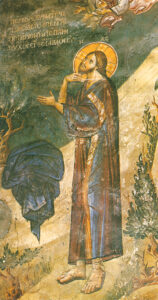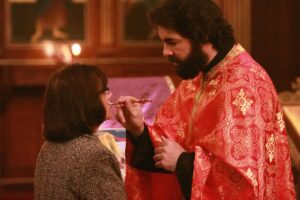Matins for Holy Thursday
Note that we’re still on our Holy Week “topsy-turvy” schedule, always “anticipating” the next appointed service. Despite my not understanding this, somehow it feels just right for this Week when the whole world gets turned upside down.
Matins Gospel: Luke 22:1-39
Jesus and the disciples are in the upper room at the house of John Mark’s mother – by tradition the Mark who later wrote the Gospel. Imagine having the Mystical Supper, the risen Lord’s Pascha night appearance and the descent of the Holy Spirit in your house!
Matthew, Mark and Luke all say this was the Passover meal. John says it was the night before the Passover – a mystery which I think has never been resolved.

Icons by permission of Saint Isaac’s Skete at skete.com
In Luke Jesus says: “I have earnestly desired to eat this Passover with you before I suffer….I shall not eat it again till it is fulfilled in the Kingdom of God… I will not drink the fruit of the vine again till the Kingdom of God comes.” A pall must have fallen over the meal which is usually a celebration. They knew what was coming, but they couldn’t face it.
The Institution of the Holy Eucharist
At the appointed time during the meal Jesus took the unleavened bread, and added the puzzling words “This is my Body given for you.” And at the end: “This is my Blood shed for you.”
What could this mean? Some Christians have given complex philosophical explanations. We Orthodox have not. Nor do we believe there is a chemical change in the Holy Gifts. They still remain bread and wine. We just accept what Christ said: “This is my Body… this is my Blood…” Not “This is to remind you of my Body… my Blood”, not “This is so you can think about my death.” (How odd that some Christians who try to take the entire Bible “literally” do not take this literally!)
Back in the middle of Blog Post 241 I pointed out the meaning of Christ’s words “Do this in remembrance of me”. The word “Remembrance” comes from the Greek “anamnesis” / “ανάμνηση”- which in the New Testament means a literal re-calling, calling again.
As the text of our Liturgy tells us, here we have “in remembrance, therefore, this saving commandment and all those things which have come to pass for us: the cross, the grave, the third-day resurrection, the ascension into heaven, the sitting at the right hand, and the second and glorious coming”. We call Christ in all His fullness to be present, all He has done and is doing and ever will do for us.
(If you are interested in my own simple non-philosophical non-dogmatic approach to the words “Body” and “Blood” – for whatever it may or may not be worth – that also is in the middle of Blog Post 241.)
Christians, guided by Saint Paul, would later emphasize that the Church also is the Body of Christ – that He meets us, comes to us, strengthens us in the holy People of God, on earth and on high. As indeed He does this in all things, if we only have eyes to see, for there is no place where Christ our God is not.
The Holy Eucharist is the place our Lord Jesus Christ specifically appointed for us to find Him and for Him to feed us on Himself – for “This is the bread that comes down from heaven, so that anyone may eat of it and not die. I am the living bread that came down from heaven. If anyone eats of this bread, he will live forever. And this bread, which I will give for the life of the world, is My flesh.” John 5:50-51
from “Orthodox Christian Chants”
We’ll say more about the Eucharist for tomorrow’s Liturgy.
The Narrative continues
Judas now goes out to betray Him. Jesus again tells His  apostles how to lead the Church – not by lording it over others but by serving them, leading them, just as He the Lord of all is servant of all and will now lead our way through death into the Resurrection. He promises His Apostles that they will sit with Him at His table in His Kingdom on thrones judging the tribes of Israel. Tonight they will fail, but He looks beyond tonight. He knows they will again be faithful.
apostles how to lead the Church – not by lording it over others but by serving them, leading them, just as He the Lord of all is servant of all and will now lead our way through death into the Resurrection. He promises His Apostles that they will sit with Him at His table in His Kingdom on thrones judging the tribes of Israel. Tonight they will fail, but He looks beyond tonight. He knows they will again be faithful.
Saint Clement’s Church, Ochrid, Macedonia
Simon Peter especially: Simon, Satan is out to get you. “No, Lord, I will go with you to prison and death”, which He did in Rome 35 years later. But not tonight. Peter, before dawn you will deny me three times – and discover how weak you are. (This is something we all need to discover.) Once I sent you all out with nothing, so you would learn to depend on God alone. But now you need provisions, a moneybag, a sword, “for now that which is written about me comes to its conclusion”. He speaks in symbols. The disciples don’t understand: “Look, we have two swords.” Jesus said: “It is enough.”
Enough swords? No. That night Peter will use a sword, and Jesus will forbid it: “He who lives by the sword will die by the sword”. Just like all the others, they also do not understand. So now He will show them. He leads them out to the Mount of Olives and into the Garden of Gethsemane.
And now, in the next three days, we will follow with Him, with them, through the final crucial events of Holy Week.
Holy Wednesday night Anointing
For most of our Orthodox history the Holy Wednesday night service was Matins/Orthros alone, which continues the Holy Week narrative. However, beginning a few hundred years ago in Greek and Antiochian  churches, Matins began to be replaced by Holy Unction. The Anointing was used as part of the preparation for Pascha Communion. In those days the Holy Eucharist was received rarely, for many only at Pascha, and there was extensive preparation – strict fasting all week, Confession and Holy Unction. This is still true in some places.
churches, Matins began to be replaced by Holy Unction. The Anointing was used as part of the preparation for Pascha Communion. In those days the Holy Eucharist was received rarely, for many only at Pascha, and there was extensive preparation – strict fasting all week, Confession and Holy Unction. This is still true in some places.
courtesy of Greek Orthodox Archdiocese of America
However, today Communions are far more frequent, and Holy Unction is also used much more often for healing those who have serious illness, as it was originally intended. Still the Holy Wednesday Anointing remains popular, at least in “Byzantine” Orthodoxy. I know Greek churches especially are full to overflowing this evening. Liturgical scholars now recommend that we do both Matins and Anointing services tonight – which is a whole lot! At Saint Nicholas, Cedarburg, we have worked out a sort of hybrid combination of the two, so nothing will be lost. (Please don’t tell anyone.)
I have come to find Holy Wednesday Unction very meaningful for myself – now to heal my sin-sick soul and my inner eyes and foggy mind – so that with my whole being at peace, I can enter into the wonderful events of these next three days and truly live them with the Lord.
I suggest that before you are anointed on Holy Wednesday night you pray something like this: “Lord, open my eyes, my ears, my heart, and enter into my soul. Focus my wandering mind. Let me walk with you, fully alert, through your Passion and Death and into your holy Resurrection.
Next Post: Holy Thursday Divine Liturgy of Saint Basil